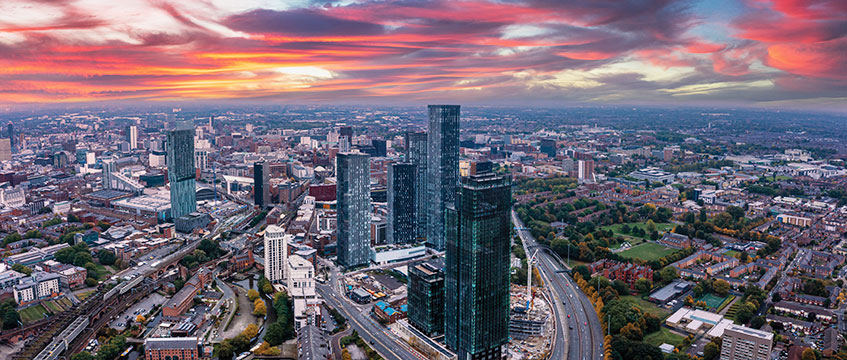Investment in build-to-rent across the big six regional cities of Birmingham, Bristol, Leeds, Manchester, Glasgow and Edinburgh fell by 77% year-on-year to £217m in the first half of 2024.
Research from JLL found that Manchester and Leeds wer.
0e the only big six markets to see BTR investment in H1 2024, split almost equally between the two cities.
The largest deal during the period was Heim Global Investor’s £81.5m forward funding of McLaren Living’s 375-home BeckYard scheme in Leeds.
Other investments included L&G UK Property Fund’s acquisition of a 50% stake in Deansgate Square’s North Tower in Manchester from another L&G fund, while CBRE IM forward funded plot C2 at ECF’s Salford Central, which will deliver 196 homes.
Rental growth case
JLL has also forecast that the UK BTR market will see rental growth of 24% over the next five years.
Birmingham has seen the highest annual rental growth of the big six cities. Average rents of new-build flats in the city have risen by 10.3% over the past 12 months.
New-build three-bedroom rental flats recorded the highest annual rental growth of 12.5%, followed by one-beds at 10% and two-beds at 7.7%.
Prime rents for new-build one- and two-bedroom flats have remained flat over the past year, while prime three-bed rents have risen by 5.3%.
The city has received total BTR investment of £1.7bn since 2020. It has 6,400 operational BTR homes, and a pipeline of 12,200 homes under construction or with planning permission granted.
The Manchester rental market also remains strong, with the average rent of a new-build flat rising by 9.4% over the past 12 months. Demand for two-bedroom rental flats appears strongest, with the average rent of new-build two-beds rising by 12.5% annually, and prime two-bed rents rising by 14.9%.
The city has also seen £1.2bn invested into the BTR sector since 2020 and has 13,400 operational homes. It has 3,400 homes in the pipeline, split equally between those under construction and those with planning permission.
Additionally, Bristol has seen high rental growth in the past 12 months, with rents on new-build flats rising by 6.7%, driven largely by sustained high demand, particularly for three-bedroom flats, which saw an annual increase in rents of 12.8%.
The city has received £275.8m in investment in the BTR sector since 2020 and has 1,400 operational BTR homes. It has a pipeline of 700 homes under construction or with planning permission.
The annual growth in rents of new-build flats in Leeds has been more subdued, at 2.3%, with smaller, more affordable rental homes recording higher annual rental growth. New-build one-bedroom flats saw rents rise by 5.3% annually, two-beds by 3.6% and three-beds remained flat.
The city has received £953m of investment in BTR since 2020 and has 4,300 operational BTR homes. It has a pipeline of 7,400 homes under construction or having received planning permission.
Mixed picture in Scotland
Turning to Scotland, the Edinburgh market has also been calmer, with average new-build rents in the city increasing by 4% in the past 12 months.
The city has received £420m of BTR investment since 2020 and has 740 operational BTR homes. In addition, the city has 3,470 homes in the pipeline.
Glasgow has seen stronger rental growth over the past year of more than 7%. New-build one- and two-bedroom flats have both recorded annual growth of 7.6%, while the average rent for three beds has risen by 6.3%.
The city has received £288.4m of investment in the BTR sector since 2020 and has 2,200 operational BTR homes. Glasgow also has an approved pipeline of 4,000 homes, but none currently under construction.
Photo © Mark Campbell/Shutterstock
Send feedback to Akanksha Soni
Follow Estates Gazette











